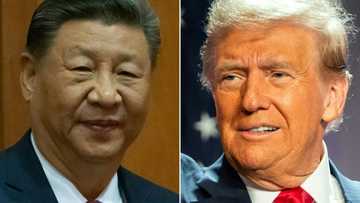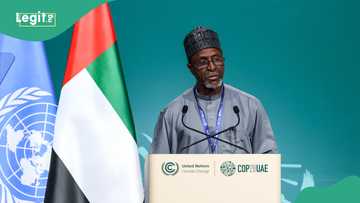How Climate Change Can Solve Nigeria's Farmer-Herder's Clashes in 5 Ways
- The ongoing clashes between Nigerian farmers and herders have been traced to the challenge of climate change
- Rasheedat Bamgbola, an expert on climate change, told Legit.ng in an exclusive interview that unprecedented rainfall, desertification and drought are the reasons herders are leaving the north for the south
- Bamgbola then suggested five ways in which the challenges can be solved through effective policies on climate change
CHECK OUT: Education is Your Right! Don’t Let Social Norms Hold You Back. Learn Online with LEGIT. Enroll Now!
Rasheedat Bamgbola, an expert on climate change, has stated that unprecedented rainfall, desertification and drought are why herders float in southern Nigeria.
In an exclusive interview with Legit.ng, Bamgbola noted that it was true that climate change had been the cause of the clashes between the farmers and herders in Nigeria.

Source: Twitter
Policies that can solver farmers-herders crisis
However, she suggested five policies that the government needed to adopt to solve the consistent challenges between harder and farmers in Nigeria.
She told Legit.ng:
"Desertification, drought, and unpredictable rainfall have reduced grazing lands in the north, forcing herders to move south into farming communities. This movement often leads to competition for resources, misunderstandings, and violent conflicts.
"While climate change is a major factor, one way to resolve this issue is through policies that encourage herders to practice sustainable agriculture. The government should designate large grazing reserves where herders can feed their animals without encroaching on farmlands. These reserves can also host facilities to convert animal waste into biogas, which can power irrigation systems and provide water to grow crops for animal feed.
"Many herders are unaware of the potential of animal waste as a resource. Instead of grazing their animals on farmlands, they could stay in one place, generate gas for cooking, and use the leftover by-products as fertilizer for their crops. By adopting sustainable farming practices, herders could improve their livelihoods, reduce conflicts, and help combat climate change."
How to make peace between farmers and herders
According to Bamgbola, to ensure lasting peace, the following steps should also be taken:
- Improve land management: Establish grazing reserves and ranching systems, and improve water resource management to reduce migration for pasture.
- Invest in climate adaptation: Provide farmers and herders with access to irrigation systems, drought-resistant crops, and early warning systems for weather changes.
- Encourage community dialogue: Create platforms where farmers and herders can share concerns and resolve disputes, with support from traditional and religious leaders.
- Enhance security and enforce laws: Strengthen law enforcement to prevent violence and support peace-building efforts.
- Address climate change: Invest in afforestation, renewable energy, and other climate-smart projects to restore degraded land and improve environmental sustainability.
She then concluded that by by combining these efforts, Nigeria can reduce conflicts and create a win-win situation where farmers and herders benefit while fighting climate change.
Tinubu govt names Nigeria's delegates on climate change
Legit.ng earlier reported that President Bola Tinubu-led federal government has disclosed the number of delegates it sponsored for the climate change summit in Dubai.
In a statement by the Ministry of Information, seen by Legit.ng, the government noted that the overall delegates on its train to the Arab country included those sponsored by the government (Federal and State Governments) and others were not government-sponsored, which included (Private Companies, NGOs, CSOs, Media, academia, etc).
Many Nigerians have criticised the government for the large number of delegations on President Bola Tinubu's train to the ongoing Climate Summit in Dubai, otherwise called COP28.
PAY ATTENTION: Сheck out news that is picked exactly for YOU ➡️ find the “Recommended for you” block on the home page and enjoy!
Source: Legit.ng





